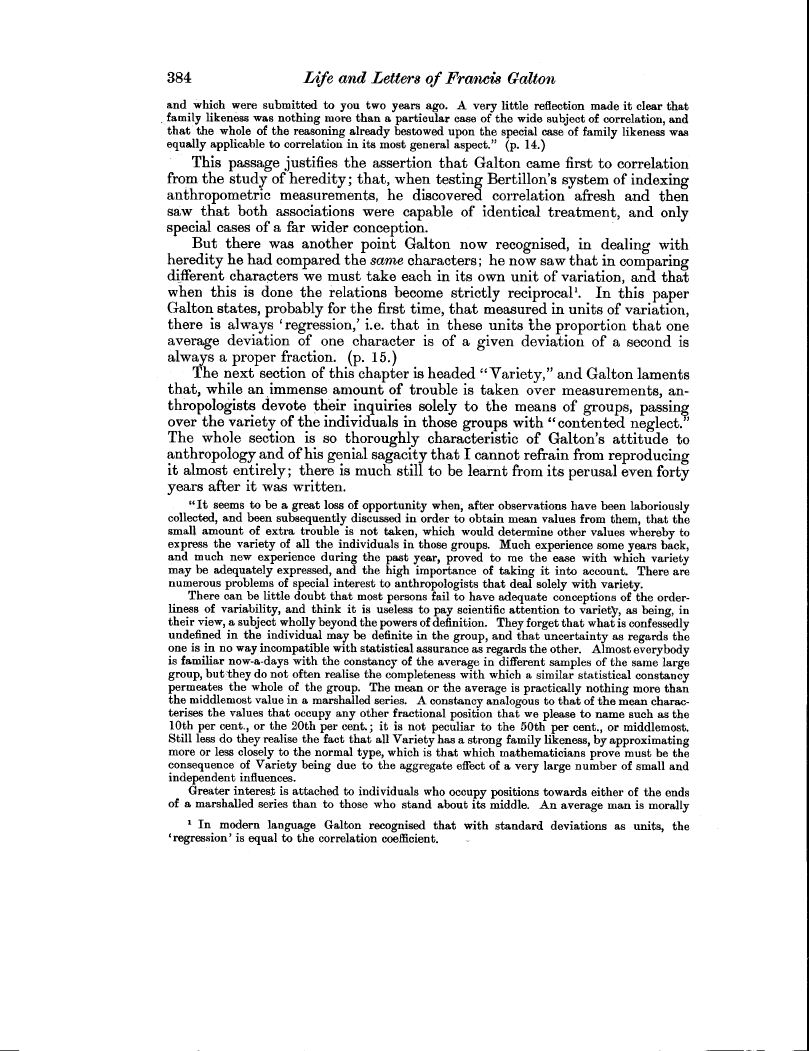384 Life and Letters of Francis Galton
and which were submitted to you two years ago. A very little reflection made it clear that family likeness was nothing more than a particular case of the wide subject of correlation, and that the whole of the reasoning already bestowed upon the special case of family likeness was equally applicable to correlation in its most general aspect." (p. 14.)
This passage justifies the assertion that Galton came first to correlation from the study of heredity; that, when testing Bertillon's system of indexing anthropometric measurements, he discovered correlation afresh and then saw that both associations were capable of identical treatment, and only special cases of a far wider conception.
But there was another point Galton now recognised, in dealing with heredity he had compared the same characters; he now saw that in comparing different characters we must take each in its own unit of variation, and that when this is done the relations become strictly reciprocal'. In this paper Galton states, probably for the first time, that measured in units of variation, there is always `regression,' i.e. that in these units the proportion that one average deviation of one character is of a given deviation of a second is always a proper fraction. (p. 15.)
The next section of this chapter is headed "Variety," and Galton laments that, while an immense amount of trouble is taken over measurements, anthropologists devote their inquiries solely to the means of groups, passing over the variety of the individuals in those groups with "contented neglect." The whole section is so thoroughly characteristic of Galton's attitude to anthropology and of his genial sagacity that I cannot refrain from reproducing it almost entirely; there is much still to be learnt from its perusal even forty years after it was written.
"It seems to be a great loss of opportunity when, after observations have been laboriously collected, and been subsequently discussed in order to obtain mean values from them, that the small amount of extra trouble is not taken, which would determine other values whereby to express the variety of all the individuals in those groups. Much experience some years back, and much new experience during the past year, proved to me the ease with which variety may be adequately expressed, and the high importance of taking it into account. There are numerous problems of special interest to anthropologists that deal solely with variety.
There can be little doubt that most persons fail to have adequate conceptions of the orderliness of variability, and think it is useless to pay scientific attention to variety, as being, in their view, a subject wholly beyond the powers of definition. They forget that what is confessedly undefined in the individual may be definite in the group, and that uncertainty as regards the one is in no way incompatible with statistical assurance as regards the other. Almost everybody is familiar now-a-days with the constancy of the average in different samples of the same large group, but they do not often realise the completeness with which a similar statistical constancy permeates the whole of the group. The mean or the average is practically nothing more than the middlemost value in a marshalled series. A constancy analogous to that of the mean characterises the values that occupy any other fractional position that we please to name such as the 10th per cent., or the 20th per cent.; it is not peculiar to the 50th per cent., or middlemost. Still less do they realise the fact that all Variety has a strong family likeness, by approximating more or less closely to the normal type, which is that which mathematicians prove must be the consequence of Variety being due to the aggregate effect of a very large number of small and independent influences.
Greater interest is attached to individuals who occupy positions towards either of the ends of a marshalled series than to those who stand about its middle. An average man is morally
' In modern language Galton recognised that with standard deviations as units, the 'regression' is equal to the correlation coefficient.

